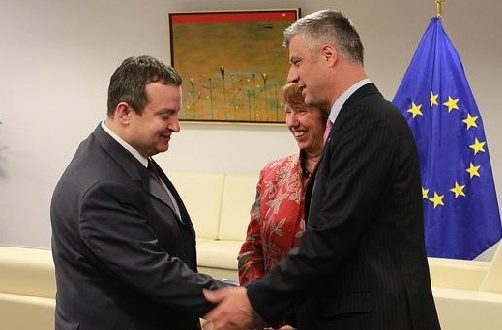Police
Kosovo and Serbia reached the First Agreement of Principles Governing the Normalisation of Relations (referred to as the Brussels Agreement) on 19 April 2013.
Among others they agreed on:
- the dissolution of Serb police parallel structures in the north;
- the integration of their personnel into Kosovo Police; and
- the termination of their salary payments from the budget of Serbia.
This came as a consequence of the unauthorized operation of Serb police in the north of Kosovo; which has functioned for years under the Serbian legal framework and under the command of the Ministry of Interior of Serbia (MUP).
Following the agreement, parties introduced the Implementation Plan on 23 May 2013, setting the timeframe for the integration of police.
Serbia closed MUP offices on 5 July 2013, and handed over the equipment that they used, under the verification and monitoring of the EULEX. The Government of Serbia included all personnel in an early retirement scheme, through a decree, issued in December 2013. As a result, Serbia will continue to pay 60% of their final salary -as a pension- and will continue to pay their health insurance until Kosovo develops its health coverage scheme.
In the process of implementation; to ensure the integration of Serb police personnel and civil protection personnel, Kosovo adopted the Law on Amnesty (19 September 2013). This law would provide amnesty for members of Serbian security institutions operating in the territory of Kosovo who have been convicted of certain specified criminal offences, who are under prosecution for such criminal offences, or could be subject to prosecution for such criminal offence, committed prior to June 2013. The newly adopted Law on Amnesty would enable their integration into Kosovo equivalent structures, to the possible extent, and would serve as a measure of confidence-building.
In line with the agreement, on 22 July 2013, Kosovo established the Police Regional Directorate covering four northern municipalities. This directorate covers four police stations (North Mitrovicë/a, Zubin Potok, Zvečan/Zveçan, Leposavić/Leposaviq) and three sub-stations (Çabër, Bistricë and Lip). The Regional Director is a Kosovo Serb and the Deputy Director is a Kosovo Albanian.
According to the Kosovo Police categorisation, the police station in North Mitrovicë/a was a category B station, with 110-120 police officers, with this number rising to almost 170 after integration.
Belgrade provided the list of the police officers to be integrated. After receiving the list, the Kosovo Ministry of Internal Affairs (MoIA) forwarded it to the Kosovo Police for verification and background checks for the candidates.
Since they already had the skills and experience, they were only required to take a one-week orientation training at the Kosovo Academy for Public Safety in Vushtrri (between mid-December 2013 and the beginning of February 2014) to familiarize with the Kosovar legal system and the standard police operating procedures and equipment.
By late 2013, Kosovo Police integrated 287 former MUP members in their ranks (out of 337 former MUP employees that took part in the process). As for the ones that did not manage to get integrated, they either did not pass the background check (verification of the criminal record) by the Kosovo institutions or were close to retirement; some even refused to be integrated or to sign the ‘Declaration of loyalty’; a document that obliged them to serve solely to the Republic of Kosovo and to obey its laws, accepting no other salary, but from the Kosovo budget.
The civil administrate of MUP, which issued civil registry documents of Serbia and dealt with other administrative issues was also integrated. From 71 personnel, 32 were integrated at Kosovo Civil Registry Agency.

With the integration of Kosovo Serbs, Kosovo Police formally became the only police force operating throughout Kosovo, providing safety, public order and law enforcement.
Although the security situation in northern municipalities is improved, the ethnic incidents are reduced, and the trust is somehow restored, there are still some functionalization problems (such as the language barrier).


